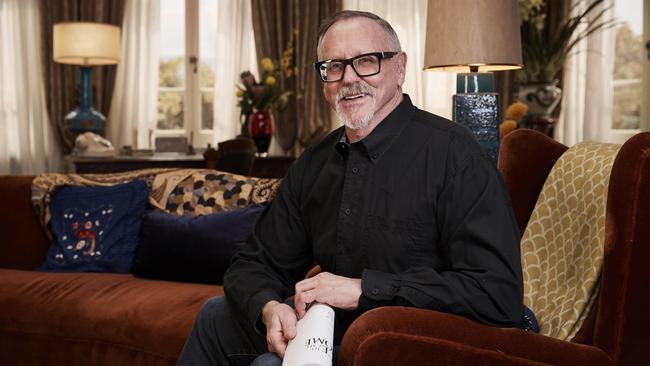Bevan Lee has spent a lifetime telling Australians their own stories
Since the 1980s, Bevan Lee has described Australia to itself through the medium of commercial television drama.

The award-winning A Place To Call Home is drawing to an end on Foxtel, but its creator, Bevan Lee, has already written his next project, a “glorious super soap” he says will be the equivalent of a fantastic summer beach read.
The project — he won’t reveal the title — already has eight episodes written now with Seven executives who are deciding if they will commission it.
“I wanted to write a TV equivalent of the fantastic summer beach read, the book you pick up and you simply cannot put down, and I’m really thrilled with this,” Lee tells The Australian’s Behind the Media podcast.
Since the 1980s, Lee has described Australia to itself through the medium of commercial television drama, working on Sons and Daughters as a writer and rewriting the first episode of Home and Away before creating Always Greener, Packed to the Rafters and Winners & Losers.
A Place to Call Home, which won a Logie last year for most outstanding drama series, is midway through its final season on Foxtel.
If Seven decides to make the new high-concept drama, it will be due in no small part to Lee’s track record. “There are mega bitches and mega bastards and more slapped faces and swishing from the room than you can shake a stick at,” Lee says.
Packed to the Rafters was one of Seven’s biggest drama hits, a family drama at a time the industry was obsessed with nihilistic detective procedurals. And A Place To Call Home is that rarest of entities, cancelled by one network (Seven) and rescued by another (Foxtel).
The final season of A Place to Call Home, a melodrama set in rural NSW in the 1950s, recently appeared in cinemas. Lee says he got a certain satisfaction when the audience of mainly over-40 women reached into their handbags for their tissues at the episode’s emotional conclusion.
“I don’t think overall in Australian drama that there is enough emotion. I think, overall, a lot of Australian dramas tend to be fearful of emotion for fear that the emotion might make them melodrama rather than drama, but I embrace emotion in drama.”
A Place to Call Home lasted for two years on Seven, and was rating well, but Seven cancelled it because the older demographic was not advertiser-friendly. But that demographic worked well for Foxtel, which got Seven to make four more seasons.
“Broke my heart, almost drove me nuts,” Lee says of the cancellation. “It hurt me because I had unresolved creative energy with it.” But he acknowledged the commercial realities behind Seven’s decision.
Lee is a fierce critic of the state of Australian television, which he says is far too character-driven and not plot-driven, although he is wary of sounding like a grumpy old man. TV drama in the US is incredible, he says. But he is critical of local fare on the ABC. But he stresses that it is his own personal opinion.
“(There are) shows that would be better off on commercial TV or good ideas under-realised because they are made by people lacking the necessary experience.
“Somehow or other the institution that turned out Brides of Christ, The Leaving of Liverpool, Phoenix and Janus, Mother and Son … is now turning out shows that would be much better placed on commercial networks. And even then, they’re not very good versions. All I know is that there is stuff that just doesn’t interest me.”
Part of the issue is that mentoring and industry progression is a big problem, he says.
“I didn’t create my own shows for 18 years. What happens now is these young people go into the film and television school, and good on them, and then they come out after three years going ‘this is my show’.”
He is not a fan of social media, seeing it as creating false personas that are disruptive to his creative processes. He loves fans having an investment in a show but is against the rights fans have from that investment in attempting to interfere in the creative process.
“Social media has encouraged people who are fans of the show to presume they have some right to comment on its creativity.
“Feel invested, but it is the rights that many presume they have from that investment.
“And so I keep out of it, because I see it bringing, at best, presumption and, at worst, an ugliness to the landscape of reaction to the show.”



To join the conversation, please log in. Don't have an account? Register
Join the conversation, you are commenting as Logout